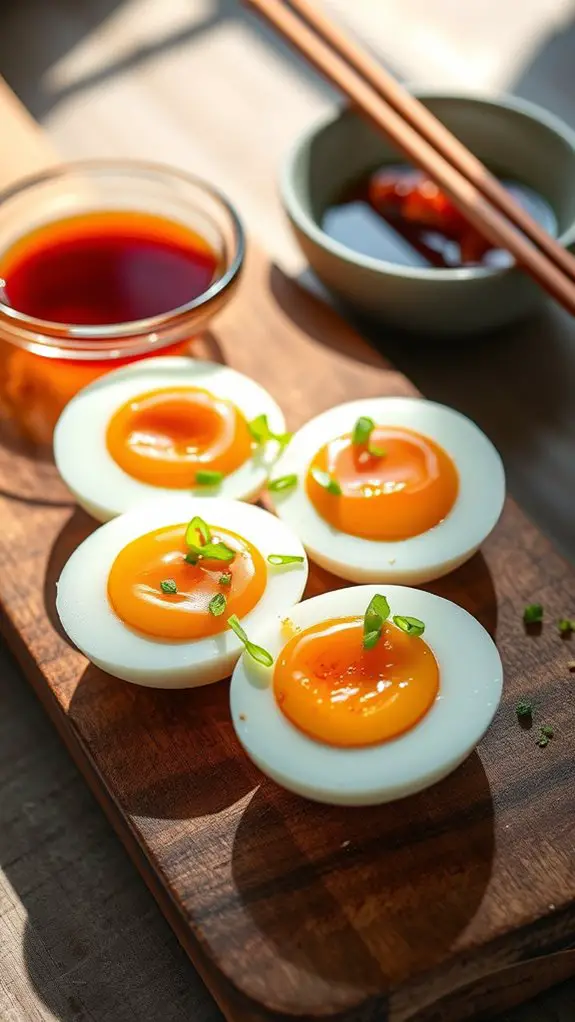Korean Marinated Eggs

You might not know that the origins of Korean marinated eggs, or "Mayak Kyeran," can be traced back centuries, reflecting a rich culinary tradition. While the basic recipe is straightforward, mastering the balance of flavors requires skill and experience. Explore the fascinating history and modern appeal of this delicacy, uncovering why it has gained widespread popularity as a versatile addition to meals.
History

Although the origins of Korean marinated eggs, known as "Mayak Kyeran," can be traced back centuries, their popularity as a contemporary culinary staple has surged in recent decades.
This traditional dish's cultural significance has endured, reflecting the country's rich gastronomic heritage. Over time, the recipe has evolved, with regional variations emerging that showcase the creative spirit of Korean cooks.
Today, these flavorful, visually striking eggs have become a ubiquitous part of the Korean dining experience, appealing to both local palates and global food enthusiasts drawn to their unique taste and vibrant presentation.
Recipe

Preparing these marinated eggs is a simple yet satisfying process that can be easily incorporated into your culinary repertoire. The result is a dish that not only tantalizes the taste buds but also adds a visually appealing touch to your dining experience.
Ingredients:
- 6 large eggs
- 1/4 cup soy sauce
- 2 tablespoons rice vinegar
- 1 tablespoon brown sugar
- 1 teaspoon sesame oil
- 1 clove garlic, minced
- 1/2 teaspoon ground ginger
- 1/4 teaspoon black pepper
Instructions:
In a saucepan, place the eggs and cover them with water. Bring the water to a boil, then reduce the heat and simmer for 10 minutes. Drain the eggs and let them cool. Peel the eggs and set them aside.
In a shallow baking dish or bowl, combine the soy sauce, rice vinegar, brown sugar, sesame oil, garlic, ground ginger, and black pepper. Whisk the marinade until the sugar is dissolved. Gently add the peeled eggs to the marinade, making sure they're fully submerged. Cover the dish and refrigerate for at least 4 hours, or up to 24 hours, turning the eggs occasionally to guarantee even marination.
Tips:
For best results, marinate the eggs for at least 12 hours to allow the flavors to fully penetrate the eggs. The longer the eggs marinate, the more intense the flavor will be.
Serve the marinated eggs chilled or at room temperature, and enjoy them as a delightful side dish or snack.
Nutritional Guide
One serving of these Korean marinated eggs provides a nutritious boost, delivering a balance of macronutrients and important micronutrients.
Each egg contains roughly 78 calories, offering a moderate amount of protein, healthy fats, and negligible carbohydrates. The nutritional benefits include a significant dose of vitamin B12, riboflavin, and selenium, all of which support energy metabolism and immune function.
Additionally, the eggs contain choline, a nutrient essential for brain health and development. The calorie content makes these eggs a versatile, nutrient-dense option that can be enjoyed as a snack or incorporated into various meals throughout the day.
Final Thought
Korean marinated eggs can be a remarkable addition to your culinary repertoire, offering a delightful fusion of flavors and a nutritious boost.
As you refine your cooking techniques, you'll discover how the interplay of soy sauce, rice vinegar, and aromatic spices can elevate the humble egg into a sophisticated, flavor-packed delicacy.
Explore the nuanced flavor profiles by experimenting with different marinades and adjusting the duration of soaking.
Your final thought should be one of gratification, knowing that you've accessed a versatile, health-conscious dish that can be enjoyed as a snack, side, or even incorporated into various meals.
With Korean marinated eggs, you've opened a world of culinary possibilities.





